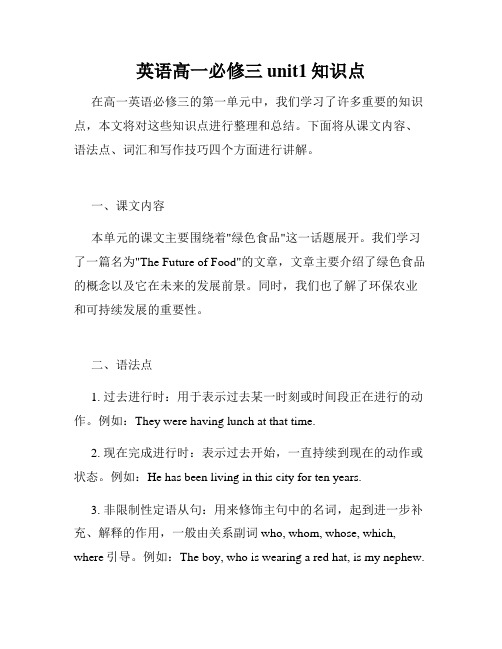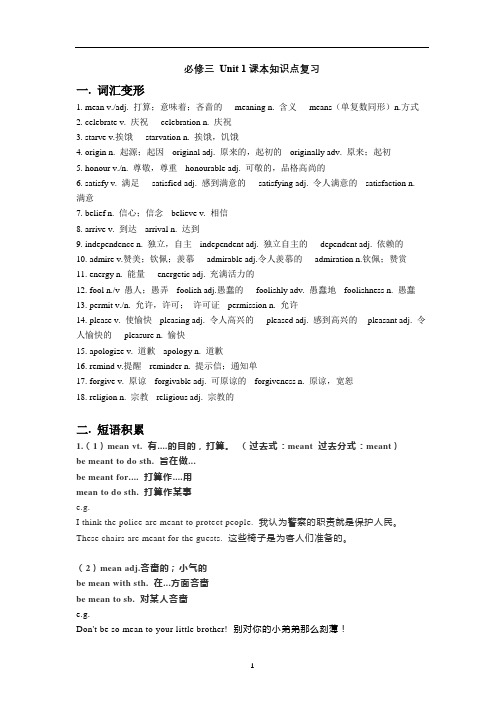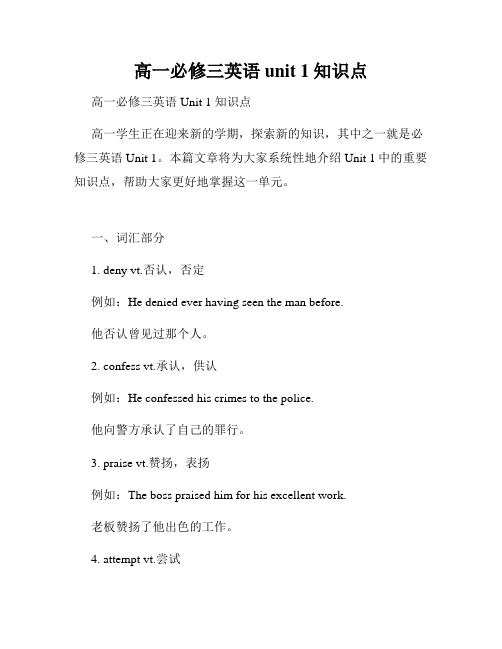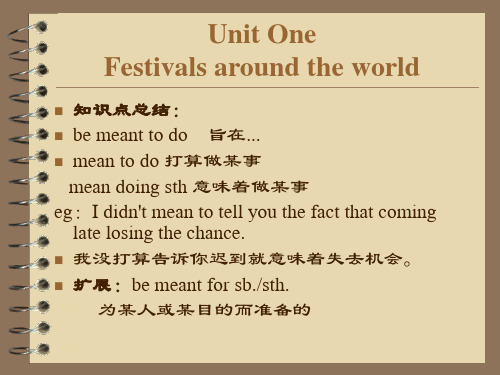高一英语必修3 unit1单元知识点归纳
英语高一必修三unit1知识点

英语高一必修三unit1知识点在高一英语必修三的第一单元中,我们学习了许多重要的知识点,本文将对这些知识点进行整理和总结。
下面将从课文内容、语法点、词汇和写作技巧四个方面进行讲解。
一、课文内容本单元的课文主要围绕着"绿色食品"这一话题展开。
我们学习了一篇名为"The Future of Food"的文章,文章主要介绍了绿色食品的概念以及它在未来的发展前景。
同时,我们也了解了环保农业和可持续发展的重要性。
二、语法点1. 过去进行时:用于表示过去某一时刻或时间段正在进行的动作。
例如:They were having lunch at that time.2. 现在完成进行时:表示过去开始,一直持续到现在的动作或状态。
例如:He has been living in this city for ten years.3. 非限制性定语从句:用来修饰主句中的名词,起到进一步补充、解释的作用,一般由关系副词who, whom, whose, which, where引导。
例如:The boy, who is wearing a red hat, is my nephew.4. 由疑问词引导的特殊疑问句:包括对地点、时间、原因、方式、人物等提问。
例如:Where did you go yesterday?三、词汇1. environmental:环境的2. organic:有机的3. conventionally:传统地4. pesticide:农药5. biotechnology:生物技术6. innovation:创新四、写作技巧1. 遣词造句:在写作时,可以运用丰富多样的词汇和句型来增加文章的表达力。
可以使用形容词和副词来描述事物,运用各种连接词来展示逻辑关系。
2. 开头和结尾:开头要简洁明了地表达主题,吸引读者的注意力;结尾要提出自己的观点或总结全文内容,给读者留下深刻的印象。
人教高中英语必修三Unit1课本知识点复习

必修三Unit 1课本知识点复习一. 词汇变形1. mean v./adj. 打算;意味着;吝啬的-- meaning n. 含义-- means(单复数同形)n.方式2. celebrate v. 庆祝-- celebration n. 庆祝3. starve v.挨饿-- starvation n. 挨饿,饥饿4. origin n. 起源;起因-- original adj. 原来的,起初的-- originally adv. 原来;起初5. honour v./n. 尊敬,尊重-- honourable adj. 可敬的,品格高尚的6. satisfy v. 满足-- satisfied adj. 感到满意的-- satisfying adj. 令人满意的-- satisfaction n. 满意7. belief n. 信心;信念-- believe v. 相信8. arrive v. 到达-- arrival n. 达到9. independence n. 独立,自主-- independent adj. 独立自主的-- dependent adj. 依赖的10. admire v.赞美;钦佩;羡慕-- admirable adj.令人羡慕的-- admiration n.钦佩;赞赏11. energy n. 能量-- energetic adj. 充满活力的12. fool n./v 愚人;愚弄-- foolish adj.愚蠢的-- foolishly adv. 愚蠢地-- foolishness n. 愚蠢13. permit v./n. 允许,许可;许可证-- permission n. 允许14. please v. 使愉快-- pleasing adj. 令人高兴的-- pleased adj. 感到高兴的--pleasant adj. 令人愉快的-- pleasure n. 愉快15. apologize v. 道歉-- apology n. 道歉16. remind v.提醒-- reminder n. 提示信;通知单17. forgive v. 原谅-- forgivable adj. 可原谅的-- forgiveness n. 原谅,宽恕18. religion n. 宗教-- religious adj. 宗教的二. 短语积累1.(1)mean vt. 有....的目的,打算。
高一必修三英语unit 1知识点

高一必修三英语unit 1知识点高一必修三英语Unit 1 知识点高一学生正在迎来新的学期,探索新的知识,其中之一就是必修三英语Unit 1。
本篇文章将为大家系统性地介绍Unit 1中的重要知识点,帮助大家更好地掌握这一单元。
一、词汇部分1. deny vt.否认,否定例如:He denied ever having seen the man before.他否认曾见过那个人。
2. confess vt.承认,供认例如:He confessed his crimes to the police.他向警方承认了自己的罪行。
3. praise vt.赞扬,表扬例如:The boss praised him for his excellent work.老板赞扬了他出色的工作。
4. attempt vt.尝试例如:He attempted to climb the mountain without any equipment.他试图不带任何装备攀登这座山。
5. hesitate vi.犹豫例如:She hesitated for a moment and then said "yes".她犹豫了一会儿,然后说“是的”。
二、从句部分1. 定语从句定语从句是修饰一个名词或代词的从句,通常使用关系代词或关系副词引导。
注意区分限制性定语从句和非限制性定语从句。
例如:The book that I borrowed from the library is very interesting.我从图书馆借的那本书非常有趣。
2. 时间状语从句时间状语从句用来表示一个动作或事件发生的时间,常用的引导词有when, while, before, after等。
例如:I will call you when I get home.我回家后会给你打电话。
3. 条件状语从句条件状语从句用来表示在某个条件下会发生的动作或事件,常用的引导词有if, unless等。
高一英语必修三知识点归纳笔记(一)

高一英语必修三知识点归纳笔记(一) Unit 1 Great Scientists•Vocabulary:–scientist–theory–experiment–observe–evidence•Grammar:–Passive voice–Infinitive with “to”–Non-finite verbs•Reading:–Biography of Marie Curie–Reading strategies•Writing:–Writing a biographyUnit 2 English around the world•Vocabulary:–dialect–accent–slang–lingua franca•Grammar:–Modal verbs–Conditional sentences•Reading:– A survey of English dialects– A speech by Barack Obama•Writing:–Writing a speechUnit 3 Travel journal•Vocabulary:–destination–accommodation–itinerary–landmark•Grammar:–Relative clauses–Adverb clauses•Reading:–Travel journals by famous writers– A travel blog•Writing:–Writing a travel journal以上是高一英语必修三的知识点归纳,希望能够对同学们学习英语有所帮助。
Unit 4 Music•Vocabulary:–melody–rhythm–harmony–genre•Grammar:–Indirect speech–Inversion•Reading:–Biographies of famous musicians–Interviews with musicians•Writing:–Writing a music reviewUnit 5 Theme parks•Vocabulary:–attraction–thrill ride–admission–souvenir•Grammar:–Adjective clauses–Past perfect tense•Reading:–Reviews of theme parks–Brochures for theme parks•Writing:–Writing a review of a theme park Unit 6 Films and cinema•Vocabulary:–plot–character–genre–screenplay•Grammar:–Reported speech–Passive voice (review)•Reading:–Film synopses–Interviews with film directors•Writing:–Writing a film review这些是高一英语必修三的所有知识点,学生们可以根据这些内容进行学习和复习。
高一必修三英语unit1单词知识点

高一必修三英语unit1单词知识点Unit 1 Word Knowledge in English for High School FreshmenIntroduction:In the first unit of the English curriculum for high school freshmen, various word knowledge points are introduced. This article aims to provide a comprehensive overview of the key vocabulary and their meanings, as well as their usage in different contexts. Let us delve deeper into the Unit 1 Word Knowledge.1. Nouns:Nouns are words that represent people, places, objects, or concepts. In Unit 1, we encounter several important nouns. For example:- Prototype: refers to an original model or form on which other things are copied or based.- Paradox: denotes a seemingly contradictory statement that may prove to be true upon further examination.2. Verbs:Verbs are action words that express an occurrence, process, or state. Unit 1 covers significant verbs, such as:- Assimilate: means to absorb and integrate information into one's understanding or knowledge.- Validate: implies confirming or establishing the truth, accuracy, or legitimacy of something.3. Adjectives:Adjectives describe or modify nouns, providing additional information about them. In this unit, we come across essential adjectives, including:- Profound: describes something with deep meaning, significance, or impact.- Elusive: portrays something or someone difficult to find, catch, or remember.4. Adverbs:Adverbs enhance the meaning of verbs, adjectives, or other adverbs by providing details about time, manner, place, or degree. Key adverbs in Unit 1 are:- Inevitably: denotes an action or event that cannot be avoided or prevented.- Explicitly: means expressing something clearly, without ambiguity or vagueness.5. Phrasal Verbs:Phrasal verbs are verb phrases comprised of a verb and one or more particles (prepositions or adverbs). In this unit, we encounter significant phrasal verbs, such as:- Set out: refers to starting a journey or task with a particular intention or goal.- Look up: means directing one's gaze upwards or searching for information in a reference source.6. Idioms:Idioms are phrases or expressions whose meanings may differ from the individual words used. Unit 1 introduces idioms that students should be familiar with, for instance:- Break the ice: signifies initiating a conversation or overcoming initial social awkwardness.- A piece of cake: denotes an easy or simple task.Conclusion:Developing a strong grasp of word knowledge is crucial for mastering any language. This article has highlighted key vocabulary in Unit 1 of the high school English curriculum, ranging from nouns and verbs to adjectives, adverbs, phrasal verbs, and idioms. By understanding these words and their usage, students can enhance their overall English proficiency. Keep exploring and practicing these word knowledge points to excel in your English studies!。
高一英语必修三unit1知识点

in ....of
in praise of in search of in support of in face of in need of in honour of in charge of in want of in place of in favour of 赞美,歌颂 寻找 支持 面对 需要 为了...表示敬意 负责,掌管 需要 代替 支持,赞同
习题练习
Many Chinese universities provide D scholarships for students___financial aid. A.in favour of B.in honour of C.in face of D.in need of My sister was against my suggestion while A my brother was ___it. A.in favour of B.in memory of C.in honour of D.in search of
turn up
出现,到达, 出现,到达,露面 eg:他在最后一刻终于出现了。 He turned up at the last moment. 发现, 发现,找到 挖掘 开大一点; 把...开大一点;增强力量、声音等 开大一点 增强力量、
turn扩展词组: 扩展词组: 扩展词组
turn about turn away turn down turn off turn over turn to turn against turn back turn in turn on turn out 转向一头,回头 解雇 关小,拒绝 关掉,转弯 翻转 求助于,转向 背叛 原路返回 上交,告发 打开 证明是
练习题
C Father ____goes to the gym with us although he dislikes going there. A.hardly B.seldom C.sometimes D.never
高一必修三英语第一单元知识点
高一必修三英语第一单元知识点一、词汇1. 主要单词:- century (n.) 世纪- civilization (n.) 文明- discovery (n.) 发现- influence (n. / v.) 影响- knowledge (n.) 知识- population (n.) 人口- protect (v.) 保护- respect (n. / v.) 尊重- society (n.) 社会- technology (n.) 技术2. 相关短语:- break down 损坏,发生故障- come up with 提出,想出- deal with 处理- find out 发现,查明- look forward to 期待- make up 编造,弥补- play a role 起作用- take part in 参加- turn to 求助于二、语法1. 一般现在时:表示客观事实、日常习惯等。
- 例句:The sun rises in the east.- 例句:I usually have breakfast at 7 am.2. 时间状语从句:使用when、while、before、after等引导的从句。
- 例句:I will call you after I finish my homework.- 例句:She always listens to music while she is doing homework.3. 直接引语和间接引语:将别人的话转述为间接引语时,需要注意时态和人称的变化。
- 直接引语:He said, "I am going to the park."间接引语:He said that he was going to the park.4. 及物动词和不及物动词:不及物动词后面不接宾语,而及物动词需要接宾语。
- 例句:He plays basketball very well. (及物动词)- 例句:She runs every morning. (不及物动词)三、阅读理解1. 主旨大意题:通过阅读全文,理解文章的主要观点或中心思想。
高一英语必修三第一章知识点
高一英语必修三第一章知识点第一节词汇1. 课文中的词汇:阅读课文并提取关键词汇,主要包括名词、动词、形容词、副词等。
例如:“一束鲜花”、“温暖的微笑”、“热爱”、“激动的心情”等。
2. 单词拓展:根据课文中的核心词汇,拓展相关的词汇,包括同义词、反义词、派生词等。
例如:“珍贵的” - “宝贵的”、“欢迎的” - “冷淡的”等。
3. 常用短语:提取课文中常用的短语,包括固定搭配、常用表达等。
例如:“对...来说”、“与...有关”、“以...为基础”等。
第二节语法1. 时态:归纳课文中出现的各种时态,包括一般现在时、一般过去时、现在进行时等。
例如:“I usually go to school by bus.”、“She wrote a letter to her friend yesterday.”等。
2. 语态:总结课文中的被动语态句型,理解主动语态和被动语态的转换规则。
例如:“The book was written by an American author.”、“Many trees have been planted in the park.”等。
3. 从句:分析课文中的主从复合句结构,包括定语从句、宾语从句、状语从句等。
例如:“The film that we watched last night was very interesting.”、“I believe that she will succeed.”等。
第三节阅读理解1. 主旨大意:归纳课文的主旨和总体内容,抓住文章的中心思想。
例如:“本课文主要讲述了环保和可持续发展的重要性,并鼓励大家参与其中。
”2. 细节信息:找出课文中的关键信息,包括人名、地名、时间、数字等。
例如:“The Green Earth Club was founded by a group of enthusiastic students in 2008.”3. 推理判断:根据课文的线索进行推理判断,分析作者的观点和意图。
高中英语必修三 unit 1 知识点
III---1 Festivals around the world一、知识点1.Festivals are meant to celebrate important times of year. 节日是用来庆祝一年的重要时光的。
mean doing sth. 意味着mean to do sth. 打算或企图做某事mean sb. to do sth. 打算让某人做某事be meant for 打算作……用;为…而有I believe he is meant to be a soldier.我相信他天生是要当军人的。
2. Discuss when they take place and what people do at that time. take place发生,举行take the place of代替,替代3. the beauty of the full moon 满月的美4. watch the full moon with family and friends和家人、朋友一起看满月5. Some festivals are held to honour the dead or to satisfy the ancestors, who might return either to help or to do harm. 有些节日,是为了纪念死者,或使祖先得到满足,因为祖先们有可能回到世上给人们提供帮助,也有可能带来危害。
to return to London 回到伦敦Return the book to the library. 把书归还给图书馆。
On my return from work, I saw the door was open. 我下班回家时,看见门开着。
6. …go to clean graves and light incense in memory of their ancestors…….去上坟、扫墓、烧香,以缅怀祖先。
高一英语必修三module1知识点总结
高一英语必修三module1知识点总结高一英语必修三Module 1知识点总结Module 1 of the high school English curriculum for Grade 10 covers a variety of essential knowledge points. In this article, we will summarize the key points covered in Module 1, providing a comprehensive overview for students.1. Vocabulary:- Build a strong foundation in vocabulary by learning and memorizing words related to various topics, such as technology, culture, and social issues.- Work on expanding your word bank through reading books, articles, and engaging in conversations.- Practice using new vocabulary in different contexts to enhance your understanding and usage.2. Reading Skills:- Learn effective reading strategies, including skimming and scanning, to quickly comprehend the main points of a text.- Develop the ability to infer meanings through context clues, making it easier to understand unfamiliar words or phrases.- Understand different text types and their structures, such as narrative, descriptive, and argumentative texts.3. Listening Skills:- Enhance your listening skills by regularly practicing with authentic materials, such as movies, podcasts, and recordings of native English speakers.- Focus on understanding the main ideas, supporting details, and the speaker's tone and attitude.- Take notes while listening to strengthen your ability to absorb information and remember important details.4. Speaking Skills:- Improve your ability to express yourself clearly and confidently through regular speaking practice.- Engage in conversations with classmates or English-speaking friends to develop fluency and accuracy.- Pay attention to pronunciation, stress, and intonation patterns to sound more natural.5. Writing Skills:- Master the basic elements of writing, including grammar, sentence structure, and paragraph development.- Learn different types of writing, such as essays, letters, and reports, and understand the specific requirements for each.- Revise and edit your writing to improve coherence, cohesion, and overall clarity.6. Grammar:- Gain a solid understanding of essential grammar rules, such as tenses, articles, prepositions, and conjunctions.- Practice using grammar in context to reinforce your knowledge and accuracy.- Review common grammatical mistakes and learn how to avoid them.7. Cultural Awareness:- Explore the culture of English-speaking countries, including their customs, traditions, history, and contemporary issues.- Engage in discussions and activities that promote cross-cultural understanding and appreciation.- Compare and contrast your own culture with English-speaking cultures to broaden your perspective.8. Exam Preparation:- Familiarize yourself with the format and content of English exams used in your school or region.- Practice past exam papers to develop time management skills and become comfortable with the exam conditions.- Seek guidance from teachers or tutors to identify areas that need improvement and work on them systematically.In conclusion, Module 1 of Grade 10 English covers a wide range of knowledge points necessary for building a solid foundation in the language. By focusing on vocabulary, reading, listening, speaking, writing, grammar, cultural awareness, and exam preparation, students can enhance their language skills and achieve success in their English studies.。
- 1、下载文档前请自行甄别文档内容的完整性,平台不提供额外的编辑、内容补充、找答案等附加服务。
- 2、"仅部分预览"的文档,不可在线预览部分如存在完整性等问题,可反馈申请退款(可完整预览的文档不适用该条件!)。
- 3、如文档侵犯您的权益,请联系客服反馈,我们会尽快为您处理(人工客服工作时间:9:00-18:30)。
4. award 奖品;助学金; vt (give sth.to sb.)授予; 判定 prize 奖品;赠品; vt 珍惜 reward 报答(酬);vt 酬谢;酬劳 award sb. a medal 授予某人奖章 reward sb. with 用……酬劳某人 reward sb. for sth 因……奖赏某人
• 3. apologize apology (n). apologize to sb for sth (doing sth) = say sorry to sb for doing sth
你必须为你的粗鲁行为向老师道歉。 to • You must apologize _____the teacher ______ for being so rude. _____________________________ • apologize to sb for sth/ doing sth = make an apology to sb for (doing) sth • offer an apology to sb for sth
• 10. dress up vi . 穿上盛装, 打扮
dress up in 穿……服装打扮 dress up as 打扮成……
There is no need to dress up; come as you are.
dressing up in (1) I just love the fun of ________________
starvation n. • die of starvation: starve to death • starvation wages 不够维持基本生活的工资
2. admire v. admiration n. admirable adj. 极好的;令人钦佩的 admire sb/sth admire sb for sth 因…而羡慕/佩服某人
• • • • •
5. custom n. 风俗、习俗 customs So many countries, so many __________. It is the custom (of/with sb) to do sth 做…….是一种习俗/惯例 It is the custom of the Japanese to take off their shoes when they get into a hall. • It is the custom with an Arab to stand close to his friend when talking.
ancient clothing. dress themselves up as (2)They tried to _______________________ “angels of peace”.
• • • • dress vt. dress sb. ( in… ) dress It takes time to _________ the baby. is neatly _________ dressed ____ in black. The old lady ___
customs are different from country • Social ________
• • • •
6. drown (drowned, drowned ) 1) 浸,泡 洪水淹没了街道和房子。 drowned The floods __________ the streets and houses. • 厨师把水果浸在奶油里。 drowned the fruit with cream. The cook _________ 2) 淹死 河里有一个落水的人。 There is a ____________man in the river. drowning • 借… 消愁 • drown one’s sorrow/sadness in…
M3 Unit 1
Festivals Around the world
1) starve : to cause a person or an animal to suffer severely or die of hunger 挨饿,饿死 to death during the war. Millions of people starved ____ 2)starve for sth 渴望获得某物,缺乏 starving for The homeless children are _____________(starve) love. 3) 感觉很饿(仅用于进行时) am starving • When will the dinner be ready? I ___________.
• It’s unwise of you to try to drown your sorrows in ____________________________ drinks as drinking may sometimes make you deeper in sorrow.
7. satisfy vt. 满足,使…满意; satisfy sb.
14. take place (有计划、安排)发生、举行 happen (偶然)发生 break out 突然爆发 (都不带宾语也不用于被动语态) (1)Do you know their wedding ___________ took place the other day? happen (2)How did the accident _____________? (3)A fire __________________ last night broke out
9. harm 损坏,伤害 do harm to …= harm do more harm than good 弊大于利 (1) Smoking _________________ our health. does harm to (2) If we try to solve the problem in this way, do more harm than good 弊大于利). it will _____________________(
11. play a trick on sb/play tricks on sb捉弄某人 playing tricks on • The naughty boy loves __________________ others. • trick 玩笑、 恶作剧、 诡计 • do/perform a trick 玩把戏 play a trick on /upon sb. 捉弄某人 trick sb. into doing sth. 哄骗某人去做某事 play a joke on sb /play jokes on sb 戏弄某人 have fun with sb 和…玩得开心 make fun of sb 取笑某人
• custom“风俗习惯”-国家、社会或团体许多人长 期形成的习惯 • customs 海关 • habit一个人的习惯习性 • practice惯例;习惯做法 • break a custom 破坏习俗 follow / keep up a custom 遵守习俗 get in the habit of = have the habit of 有…的习惯 form the habit of =fall into the habit of 养成…的习惯 get out of the habit of =kick the habit of 去掉…的习惯
satisfied with his satisfying / satisfactory The teacher was __________ ______________ answer.
satisfactory performance but could The actress gave a ____________ have done better.
• 12. a year/a life of plenty • 丰收年/富裕的生活 of plenty • You have a life _____________(plenty). What would you be worried about? 3. plenty of 多用在肯定句中, 否定句用 much; many 疑问句用 enough There is plenty of time There isn’t much time. Is there enough time
得知儿子找到工作,令他非常高兴。 satisfying learn the success of his son in It’s __________to job-hunting.
• 8. forgive (forgave, forgiven) forgiving adj. 宽仁的,宽大的 forgiveness n. 宽恕 • (1) 不念旧恶十分难得。 It’s best to forgive and forget. (2)请原谅他的粗鲁吧。 Please forgive him for his rudeness. • ask for forgiveness • receive forgiveness
(4)自二十世纪八十年代以来,我国发生了巨大变化
Great changes have taken place in our country since the 1980s. • take the place of 代替、取代 • take one’s place 就座 in place of 代替
15. celebrate 指以行动(如送礼、开party等)庆祝 生日、节日等。 congratulate 指以言语祝贺某人在某方面的成功 hold a celebration 举行庆祝会 in celebration of 为庆祝…… congratulate sb on sth 就某事祝贺某人 in celebration of his birthday. (1)We hold a party _______________ on your winning the gold medal in (2) Congratulate you _______________________ the 110-meter hurdling. (3)Li Ming held a party to celebrate __________ his admission congratulated toTsinghua University, and his friends_______________ him on it.
